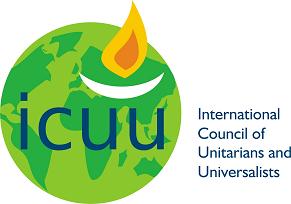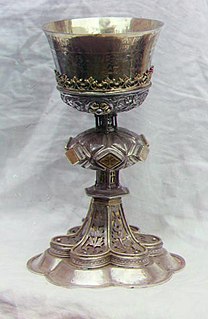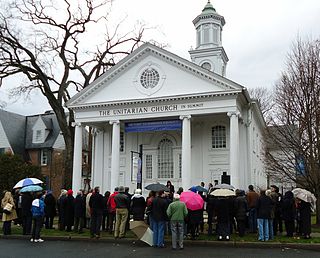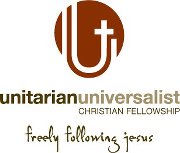
The International Council of Unitarians and Universalists (ICUU) is an umbrella organization founded in 1995 comprising many Unitarian, Universalist, and Unitarian Universalist organizations. Some groups represent only a few hundred people; while the largest, the Unitarian Universalist Association, had more than 160,000 members as of May 2011—including over 150,000 in the United States.

Unitarian Universalist Association (UUA) is a liberal religious association of Unitarian Universalist congregations. It was formed in 1961 by the consolidation of the American Unitarian Association and the Universalist Church of America. Both of these predecessor organizations began as Christian denominations of the Unitarian and Universalist varieties respectively. However, modern Unitarian Universalists see themselves as a separate religion with its own beliefs and affinities. They define themselves as non-creedal, and draw wisdom from various religions and philosophies, including humanism, pantheism, Christianity, Hinduism, Buddhism, Taoism, Judaism, Islam, and Earth-centered spirituality. Thus, the UUA is a syncretistic religious group with liberal leanings.

Unitarian Universalism (UU) is a liberal religion characterized by a "free and responsible search for truth and meaning". Unitarian Universalists assert no creed, but instead are unified by their shared search for spiritual growth, guided by a dynamic, "living tradition". Currently, these traditions are summarized by the Six Sources and Seven Principles of Unitarian Universalism, documents recognized by all congregations who choose to be a part of the Unitarian Universalist Association. These documents are 'living', meaning always open for revisiting and reworking. Unitarian Universalist (U.U.) congregations include many atheists, agnostics, and theists within their membership. There are U.U. churches, fellowships, congregations, and societies around the world. The roots of Unitarian Universalism lie in protestant liberal Christianity, specifically unitarianism and universalism. Unitarian Universalists state that from these traditions comes a deep regard for intellectual freedom and inclusive love. Congregations and members seek inspiration and derive insight from all major world religions.
Unitarianism is a nontrinitarian Christian theological movement that believes that the God in Christianity is one singular entity, as opposed to a Trinity. Most other branches of Christianity define God as one being in three persons: the Father, Son, and Holy Spirit. Unitarian Christians believe that Jesus was inspired by God in his moral teachings, and he is a savior, but he was not a deity or God incarnate.
The General Assembly of Unitarian and Free Christian Churches is the umbrella organisation for Unitarian, Free Christians and other liberal religious congregations in the United Kingdom and Ireland. It was formed in 1928, with denominational roots going back to the Great Ejection of 1662. Its headquarters building is Essex Hall in central London, on the site of the first avowedly Unitarian chapel in England, set up in 1774.

A chalice or goblet is a footed cup intended to hold a drink. In religious practice, a chalice is often used for drinking during a ceremony or may carry a certain symbolic meaning.
In Christian theology, universal reconciliation is the doctrine that all sinful and alienated human souls—because of divine love and mercy—will ultimately be reconciled to God. The doctrine has been rejected by most mainstream Christian churches, which tend to maintain at least the possibility that many are not saved, but it has received support from many prestigious Christian thinkers as well as many groups of Christians. It has been argued that the Bible itself has a variety of verses that seem to support a plurality of views.

A flaming chalice is the most widely used symbol of Unitarianism and Unitarian Universalism (UUism) and the official logo of the Unitarian Universalist Association (UUA) and other Unitarian and UU churches and societies.

The Universalist Church of America (UCA) was a Christian Universalist religious denomination in the United States. Known from 1866 as the Universalist General Convention, the name was changed to the Universalist Church of America in 1942. In 1961, it consolidated with the American Unitarian Association to form the Unitarian Universalist Association.
The Church of the Larger Fellowship (CLF) provides a ministry to isolated Unitarian Universalists (UUs). Its mission also includes growing Unitarian Universalism by supporting small congregations and new UUs around the world. The CLF also offers resources to Unitarian Universalists active in local congregations.
The National Association of Congregational Christian Churches (NACCC) is an association of about 400 churches providing fellowship for and services to churches from the Congregational tradition. The Association maintains its national office in Oak Creek, Wisconsin, a suburb of Milwaukee. The body was founded in 1955 by former clergy and laypeople of the Congregational Christian Churches in response to that denomination's pending merger with the Evangelical and Reformed Church to form the United Church of Christ in 1957.

Trinitarian universalism is a variant of belief in universal salvation, the belief that every person will be saved, that also held the Christian belief in Trinitarianism. It was particularly associated with an ex-Methodist New England minister, John Murray, and after his death in 1815 the only clergy known to be preaching Trinitarian Universalism were Paul Dean of Boston and Edward Mitchell in New York.

Unitarian Universalism, the Unitarian Universalist Association (UUA), and the Canadian Unitarian Council (CUC) have a longstanding tradition of welcoming LGBTQ people.

Christian universalism is a school of Christian theology focused around the doctrine of universal reconciliation – the view that all human beings will ultimately be saved and restored to a right relationship with God. Christian universalism and the belief or hope in the universal reconciliation through Christ can even be understood as synonyms.

The Unitarian Universalist Christian Fellowship (UUCF) is the main group serving Christian Unitarian Universalists within the Unitarian Universalist Association of the United States. The UUCF was founded in 1945 and can trace its roots back through the history of North American Christian Universalism and Unitarianism. As its bylaws put it:
We serve Christian Unitarians and Universalists according to their expressed religious needs; uphold and promote the Christian witness within the Unitarian Universalist Association; and uphold and promote the historic Unitarian and Universalist witness and conscience within the church universal.
John Wesley Hanson D.D. (1823–1901) was an American Universalist minister and a notable Universalist historian advancing the claim that Universalism was the belief of early Christianity. He was born at Boston.
Unitarian Universalist Church of Kent, Ohio is a Unitarian Universalist ("UU") church in Kent, Ohio. Founded in 1866, the current building was completed by builder Joseph Gridley (1820-1902) in 1868 on land donated by philanthropist Marvin Kent and rests on a bedrock of sandstone. Its 19 founding members were among the major movers and shakers of the then Village of Franklin Mills, and included abolitionists and Civil War veterans. They were: Dr. Aaron M. Sherman, M.D., who served as a Civil War surgeon, a prominent civic promoter, served many terms on the local school board, co-founded the Rockton Masonic Lodge that occupies the historic 1883 summer home of Marvin Kent on West Main Street, served as a State Representative in the Ohio State House of Representatives and whose 1858 home first built by Zenas Kent for his daughter Frances and her husband George Wells was recently saved, moved and restored by local historic preservation activists, Arvin Olin, Ransom Olin, Nelson Olin, Joseph Stratton, who, in 1882, donated the large bell that is in the church belfry, Phillip Boosinger, Mary Boosinger, Rhoda Boosinger, James D. Haymaker and Mary Rosetta Olin Haymaker, J.G. Whitcomb, T.H. Marshall, Eliza Wright, A. Merrell, Almund Russell, Sybil Bradley, Effie Parsons, Mary J. Parsons and Mary A. Furry. These 19 men and women gathered on May 27, 1866 to write and sign the church’s constitution in the historic 1836 Village Hall that would serve as an early place of worship before the church building was completed next door in 1868. It is the only church still using its original 19th century building in the city of Kent and in 1976 the site was designed as a "significant restored building site". In the early and middle twentieth century when there were few women clergy anywhere in the United States, the church is notable for having several women ministers: Abbie Danforth in 1889, Carlotta Crosley in 1903, and Violet Kochendoerfer in 1972. Membership is between 140 and 200 full-time adults as well as 100 children in its religious education programs. The church runs a summer camp called Kent Hogwarts which is a Harry Potter-themed camp for young kids, which emphasizes chemistry, poetry, singing and community service. The church advocates social justice, environmental awareness, democracy and acceptance of diverse peoples including all religions. The Kent church follows the seven basic principles of Unitarian Universalism.

The First Universalist Church of Atlanta, organized in 1895, re-established a Universalist presence in Atlanta, Georgia. Initial missionary efforts in 1879 were short-lived and failed to establish a permanent presence in the city. With the explicit assistance the Young People's Christian Union, this second missionary effort enabled the Universalists to sustain their presence and construct a church building on East Harris in 1900. The Universalists occupied the church until 1918 when they merged with Atlanta's Unitarians.

The Unitarian Universalist Church of Lancaster is a Unitarian Universalist church located at 538 West Chestnut Street, Lancaster, Pennsylvania. The church building is part of the Historic District of the City of Lancaster. The congregation is a member of the Unitarian Universalist Association, in the Association's Central East Region. Like all Unitarian Universalist churches, it is noncreedal, covenantal and religiously liberal. According to the UUA, the Lancaster church currently has 275 members and is an LGBTQIAA+ Welcoming Congregation.










